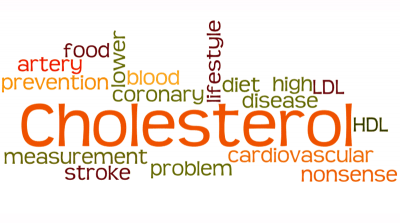For all its wonders, modern medicine also has serious drawbacks. It’s notorious for focusing on isolated variables—for each single mechanism in the body it attempts to target, it can leave others out of balance. The body operates as a whole system, so it responds to measures which encourage overall homeostasis.
Medicines that try to control parts of the body without proper knowledge of the whole inevitably yield dangerous results. For example, NSAIDs and prescription painkillers turn off pain receptors but lead to deeper issues (and don’t actually address the underlying issues causing the pain). Chemotherapy kills cancer cells, but wipes out healthy cells in the process and severely hampers the immune system. Countless pharmaceuticals trigger lists of side effects that vastly outnumber their perceived benefits.
One aspect of health that perfectly exemplifies the complex nature of the body’s homeostasis is cholesterol. As usual, modern medicine explains it through an overly simple narrative—LDL is “bad,” HDL is “good,” low cholesterol is “good,” high cholesterol is “bad.” Cholesterol drugs like statins are patterned to this narrative, and thus focus exclusively on lowering cholesterol. And statins carry a particularly horrendous array of side effects (even compared to most pharmaceuticals)—some sources report that they can affect the body in over 300 adverse ways.
Low cholesterol can be just as dangerous as high cholesterol
Even the conventional medical research community is beginning to realize that the cholesterol story is much more complicated, and that cholesterol-lowering drugs are not the answer. Studies are calling into question the dogmatic separation between good and bad cholesterol types, with even more demonstrating that low cholesterol can be just as dangerous as high cholesterol.
Cholesterol is an essential element of radiant health, not a pathology
One of top search questions for cholesterol on Google is “can you cure cholesterol?” This reveals much about the way our society views cholesterol—namely as a problem to be fixed, rather than a fundamental element of the body-system to be kept in balance.
While it is true that high cholesterol is a risk factor for heart attacks and other serious health problems, our goal cannot be simply to lower cholesterol at all costs. Studies are finally emerging that document the risks of low cholesterol. Here’s some of most prominent examples.
Cholesterol prevents hemorrhagic stroke. We’re beginning with this point because it illustrates that cholesterol is not objectively bad; in fact, low cholesterol can trigger the same class of life-threatening conditions as high cholesterol. This risk was born out by research as early as 1994,[1] and yet low cholesterol is still rarely considered a risk factor for health problems.
Cholesterol protects against Alzheimer’s and Parkinson’s. A growing body of research demonstrates that cholesterol is essential for the health of the brain. Low cholesterol can inhibit memory,[2] accelerate cognitive decline, and even increase the risk of Parkinson’s disease.[3] For this reason, an increasing number of experts are becoming concerned that cholesterol-lowering drugs may adversely affect memory, and may even be acutely neurotoxic.[4]
Cholesterol keeps the immune system functioning at its peak. Immunosuppression and immunotoxicity are two more of the worrying side effects of cholesterol-lowering drugs like statins. This danger is compounded by the fact that low cholesterol in and of itself can hamper the immune system’s ability to fight infection. Studies show that a cholesterol-healing diet can boost the body’s ability to ward off pathogens, even serious ones like tuberculosis.[5]
Cholesterol prevents (and fights) cancer. It’s been known for some time that cholesterol imbalance is a risk factor for cancer—once again, though, the imbalance is defined in the way that makes it most acceptable for drug companies to continue raking in profits from statins. The dark truth, though, is that these drugs (as well as low cholesterol itself) have actually been correlated with an increased cancer risk.[6] And cholesterol helps immensely in the process of fighting cancer; even LDL (the supposedly “bad cholesterol”) will make drug-resistant cancer cells vulnerable to chemotherapy and other cancer treatments.[7]
Low cholesterol can lead to violence, depression, and even suicide. Low cholesterol serum levels have been correlated with a decrease in the number of serotonin receptors in the brain (and thus in overall level of serotonin).[8] Because serotonin is responsible for modulating mood and behavior, this deficiency can lead to depression, violent behavior, and suicide. A strong connection has been suggested between statin use and mood destabilization, but of course drug companies won’t concede—such symptoms give them ample opportunity to sell antidepressants, antipsychotics, and mood stabilizers in addition to statins.
Don’t just lower your cholesterol, heal it
If you’re ready to start balancing and optimizing your cholesterol (rather than simply lowering it), know that lifestyle always trumps drugs. Once you address underlying imbalances, cholesterol will normalize on its own.
Eat cholesterol-healing foods like ginger, bee pollen, flax seeds (and other health sources of omega-3 fatty acids), and broccoli. Exercise frequently, and read our article about living a triglyceride-healing lifestyle.
References
[1] https://www.ncbi.nlm.nih.gov/pubmed/8124144
[2] https://www.ncbi.nlm.nih.gov/pubmed/18591462
[3] https://www.ncbi.nlm.nih.gov/pubmed/21853051
[4] http://weeksmd.com/2012/03/black-box-warning-changes-for-statin-drugs/
[5] https://www.ncbi.nlm.nih.gov/pubmed/15706008
[6] https://www.ncbi.nlm.nih.gov/pubmed/15934847
[7] https://www.ncbi.nlm.nih.gov/pubmed/17901905






